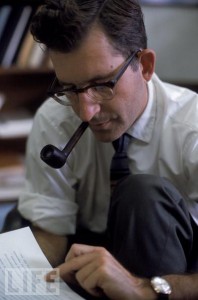Chomsky: London lectures and an 81st birthday
Ceasefire Bites, Features, Politics, Profiles - Posted on Monday, December 7, 2009 12:14 - 0 Comments
 Today, Noam Chomsky is 81. A few weeks ago, at his London lecture series – widely anticipated to be his last in the UK – he addressed crowds numbering in their thousands. Musab Younis covered his talks for Ceasefire.
Today, Noam Chomsky is 81. A few weeks ago, at his London lecture series – widely anticipated to be his last in the UK – he addressed crowds numbering in their thousands. Musab Younis covered his talks for Ceasefire.
“He should have a Nobel prize,” says the first person I speak to.
The immense Logan Hall at Bloomsbury Square is completely full and we are sitting, along with hundreds of others, in an adjoining room served by a live video link. It is the School of Oriental and African Studies’ largest ever lecture crowd and there is an air of anticipation. Noam Chomsky – linguist, philosopher, critic, polymath – is about to appear on stage. At almost 81, this is likely to be his last visit to London.
I am speaking to members of the audience at random, asking them why they have come to the lecture. The first person I have picked turns out to be a noted professor of philosophy. Has he been aware of Chomsky for a long time?
“Everyone in the world’s been aware of Chomsky for a long time,” he says, laughing, “unless they’re not literate.”
The audience is one of the most diverse I’ve ever seen. A couple of rows in front of the professor sit students Michael, Andrew and Marika, all in their twenties. “My housemate told me about this lecture,” says Michael. “I’ve only ever seen him on YouTube.”
In a three-day visit to London, entirely unadvertised except for small notices on LSE and SOAS websites, each of Chomsky’s three public talks is surrounded by huge crowds of people without tickets, desperate to get in.
Chomsky’s genius is undisputed (even by his enemies) and his astounding productivity over half a century is the stuff of legend, though often bemoaned as providing an impossible standard for others to meet: his first book, Syntactic Structures, was published a full fifty-two years ago, in 1957 – it is still in print – while his latest book, Hopes and Prospects, is scheduled for publication in 2010.
But you could still be forgiven, at first, for wondering what all the fuss is about: he speaks in a low tone, at times barely audible, with no appeal to rhetoric.
It is the substance that everyone has come for, though, and there is plenty of it. His lectures are extraordinarily wide-ranging: the Congo, Cuba, Iran, Afghanistan, Pakistan, Latin America, Britain, Iraq, the US and China are all given detailed analyses; over two hours are devoted to the Middle East. Topics range from hard-headed geopolitical analysis to a discursion into Cartesian philosophy.
In an era where politicians and the media commonly decry the “apathy” of the public, the thousands who came to listen to Chomsky demonstrated that there remains a ravenous appetite for serious political analysis. And the huge success of a lecture tour by an icon of libertarian socialism is even more impressive at a time when Britain is said to be swinging inexorably to the right,.
The main thrust of Chomsky’s message was that our current economic and political model has led us to the point where the very survival of our species is far from certain. The threefold threats of climate change, nuclear destruction and mass poverty and starvation are the results, Chomsky believes, of a worldwide politico-economic system which has privileged the wealth and power of a tiny minority above the survival of all.
To make matters worse, Obama has shown no sign of substantial change: his campaign was funded mainly by the very same large corporate institutions which are to blame for our current predicament. The US president has also escalated the ongoing onslaught along the Afghanistan-Pakistan border, still intends to control Middle Eastern resources, continues the ‘extraordinary rendition’ policy of worldwide CIA kidnap, and has taken no action to stop illegal Israeli settlement-building in the West Bank.
Chomsky is so unassuming that only occasionally are you reminded of his stature. One of those moments was at his LSE lecture, when he mentioned as an aside how he had been at the LSE a full forty years ago, in 1969, delivering a lecture at the invitation of philosophical giant Karl Popper.
Another was during a small reception held after a lecture at SOAS two days earlier, when he quietly explained to a Lithuanian student the detailed history of anti-Semitism in her country which predated, contrary to her assumptions, the Nazi invasion. She looked shocked. “I bet they didn’t teach you that in school,” he said wryly.
“He is the great moral judge of this age,” says the professor in the SOAS lecture, as a hush descends in anticipation of Chomsky’s emergence, “outstanding above all others.” The thousands who gave him a standing ovation in London last month – some of them arriving six hours early to queue for front row seats – seem to agree.
For a wide selection of Chomsky’s latest articles, visit www.chomsky.info
VICE Magazine interviewed Noam Chomsky during this lecture series. The interviewer was Kate Albright-Hanna, who was Director of Video for New Media on the Obama campaign in 2008.
http://www.vbs.tv/watch/vbs-meets/vbs-meets-noam-chomsky


Leave a Reply